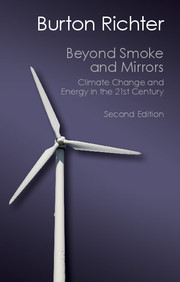Book contents
- Frontmatter
- Contents
- Preface to the Second Edition
- List of Units
- List of Conversion Factors
- List of Abbreviations
- 1 Introduction
- Part I Climate
- Part II Energy
- 6 Taking up Arms Against this Sea of Troubles
- 7 How Fast to Move: A Physicist’s Look at the Economists
- 8 Energy, Emissions, and Action
- 9 Fossil Fuels – How Much Is There?
- 10 Electricity, Emissions, and Pricing Carbon
- 11 Efficiency: the First Priority
- 12 Nuclear Energy
- 13 Renewables
- 14 Biofuels: Is There Anything There?
- 15 An Energy Summary
- Part III Policy
- References
- Index
11 - Efficiency: the First Priority
Published online by Cambridge University Press: 05 November 2014
- Frontmatter
- Contents
- Preface to the Second Edition
- List of Units
- List of Conversion Factors
- List of Abbreviations
- 1 Introduction
- Part I Climate
- Part II Energy
- 6 Taking up Arms Against this Sea of Troubles
- 7 How Fast to Move: A Physicist’s Look at the Economists
- 8 Energy, Emissions, and Action
- 9 Fossil Fuels – How Much Is There?
- 10 Electricity, Emissions, and Pricing Carbon
- 11 Efficiency: the First Priority
- 12 Nuclear Energy
- 13 Renewables
- 14 Biofuels: Is There Anything There?
- 15 An Energy Summary
- Part III Policy
- References
- Index
Summary
Introduction
There are many recent studies by governments, non-governmental organizations, and the private sector that all come to the same conclusions:
Improving energy efficiency is the cheapest and easiest way to reduce greenhouse gas emissions;
Energy not used reduces imports, emits no greenhouse gases, and is free;
The transportation and building sectors use far more energy than is necessary;
The total cost to the economy as a whole of most of the improvements is negative: we save money.
In this chapter I look at what might be done to improve energy efficiency in two of the three sectors of the US economy: transportation and buildings. The third sector, industry, has to have each process looked at separately and that is too big a job for this book.
Improving energy efficiency in buildings reduces electricity demand, thereby reducing fossil fuel use in generation, and reduces fossil fuel use for heating as well.
Increasing the efficiency with which energy is used in the transportation sector does more than reduce greenhouse gas emissions; it also reduces the imports of large amounts of oil to fuel that sector and thereby also reduces the export of the large amount of money that pays for those imports. With the high price of oil ($100 per barrel in 2014), even those few people who do not believe that cutting greenhouse gas emissions is important to reduce the danger of climate change agree that reducing oil imports is important and have become allies in a move toward a more efficient economy.
With those conclusions, it is surprising that so little has been made of the opportunities. In a market economy like those of most of the developed countries of the world, consumer demand forces manufacturers to comply with that demand in order to be competitive, or manufacturers see an advantage and work to convince the customers to buy what the manufacturers want to sell, or the government sees some national importance that makes it force efficiency on the society. Until recently the price of energy was so low that there was little if any consumer pressure for energy efficiency, manufacturers had little incentive to invest in better efficiency technology, and there was no concern on the national level because of any economic drain on the economy from energy prices.
- Type
- Chapter
- Information
- Beyond Smoke and MirrorsClimate Change and Energy in the 21st Century, pp. 150 - 188Publisher: Cambridge University PressPrint publication year: 2014



